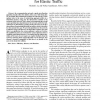Free Online Productivity Tools
i2Speak
i2Symbol
i2OCR
iTex2Img
iWeb2Print
iWeb2Shot
i2Type
iPdf2Split
iPdf2Merge
i2Bopomofo
i2Arabic
i2Style
i2Image
i2PDF
iLatex2Rtf
Sci2ools
132
click to vote
TON
2002
2002
Utility-based rate control in the Internet for elastic traffic
In a communication network, a good rate allocation algorithm should reflect the utilities of the users while being fair. We investigate this fundamental problem of achieving the system optimal rates in the sense of maximizing aggregate utility, in a distributed manner, using only the information available at the end hosts of the network. This is done by decomposing the overall system problem into subproblems for the network and for the individual users by introducing a pricing scheme. The users are to solve the problem of maximizing individual net utility, which is the utility less the amount they pay. We provide algorithms for the network to adjust its prices and the users to adjust their window sizes such that at an equilibrium the system optimum is achieved. Further, the equilibrium prices are such that the system optimum achieves weighted proportional fairness. It is notable that the update algorithms of the users do not require any explicit feedback from the network, rendering the...
Related Content
| Added | 23 Dec 2010 |
| Updated | 23 Dec 2010 |
| Type | Journal |
| Year | 2002 |
| Where | TON |
| Authors | Richard J. La, Venkat Anantharam |
Comments (0)

